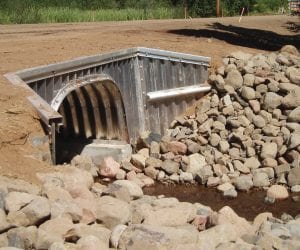Lack of a policy for dealing with maintenance of the county’s four special tax district private roadways has led to unanswered questions. A need for gravel on Mile-O-Pine before it was graded this summer caused an expenditure of $8,000 that had not been budgeted or levied, but the county has no policy on how to assess for needs like that when they arise.
On October 11, 2011, Highway Engineer David Betts discussed this with the county board along with a draft of a policy for their consideration.
All kinds of questions could arise in the absence of a policy: Who can officially make a service request on behalf of property owners along a subordinate governmental service district roadway? Who decides what really needs to be done? When extra work is performed, at what point will the county finance the cost and levy it over a period of time to the property owners who benefit from it? And how do property owners divide the cost? By lot, whether large or small? By the amount of road frontage? By the acre?
What if one property owner at the beginning of a dead-end road had a lot of frontage, but the road was used mostly by a majority of property owners who lived on smaller lots at the end of the road? Should the county do smaller maintenance projects at more frequent intervals or wait until the road gets bad, property owners request the work, and repairs are more costly?
Highway Department Maintenance Supervisor Russ Klegstad said having a county policy would help bring fairness to all property owners.
The policy Betts proposed would give the county some say in deciding what procedures would be best for any given road issue. It would also require that each road association designate a single contact person to speak for the group. It called for reserve accounts to pay for bigger expenses when they arise.
Klegstad suggested that his department meet with road association representatives at the end of every season to go over what they think needs to be done when that season rolls around again the next year.
The board discussed how the policy could address the questions raised regarding maintenance of the special tax district roads and asked Engineer Betts to go over the proposed policy with County Attorney Tim Scannell and bring it back to them at a later meeting. A decision on the Mile-OPine gravel expenses will be made after the policy has been adopted.
Snowplowing special tax district roads
The only competing bids for winter maintenance of the county’s four special service tax district roads was for Evergreen Road. Mike Rose Excavating got the job for a price of $85 per snowfall. Blomberg Brush Works had bid $158. Greg C. Gecas was awarded the Mile-O-Pine route at $100 per snowfall, and Berglund Plowing got the job for West Rosebush Lane, also at $100 per snowfall.
The county received no bids for Voyageur’s Point. That job will be re-bid.
Firewise slash piles
Maintenance Supervisor Russ Klegstad reported that his crew has been pushing up the brush left at Firewise brush piles whenever they have equipment nearby. They have not been near some of the brush piles lately, however, but private businesses like Edwin E. Thoreson Inc. and individuals like Dave Tuttle have voluntarily done this with their own equipment.
People are really bringing a lot of slash to the brush piles, Klegstad said, and contractors are making use of it as well.
Klegstad said that the board would need to authorize overtime for his crew if they wanted them to push up all the brush piles, and they would have to bring in equipment from other parts of the county. Finding employees willing to do overtime in the fall can be difficult, he said, because a lot of them are gone fishing and hunting.
County Auditor-Treasurer Braidy Powers agreed to talk to Firewise about putting the Highway Department on their agenda so they could discuss maintenance of the brush piles.
Rising price of steel
Klegstad asked for a change in his request for authorization to purchase used pallet racks to store equipment in the John Goble Building. The board had previously authorized Klegstad to purchase the racks at a price of $5,382.60, which was over the $5,000 that had been budgeted. By the time the Highway Department had received authorization to buy the racks, however, the set that had been available was gone, and the next used set they could find was being offered for $6,267.
Klegstad asked the board to authorize him to spend up to $7,500 for the racks, saying that the price of steel keeps going up. This amount is still half the cost of buying new, he said.
The cost would be offset by an extra $27,500 the department received for the sale of equipment over what had been budgeted for those sales.
The board approved the request.



Leave a Reply